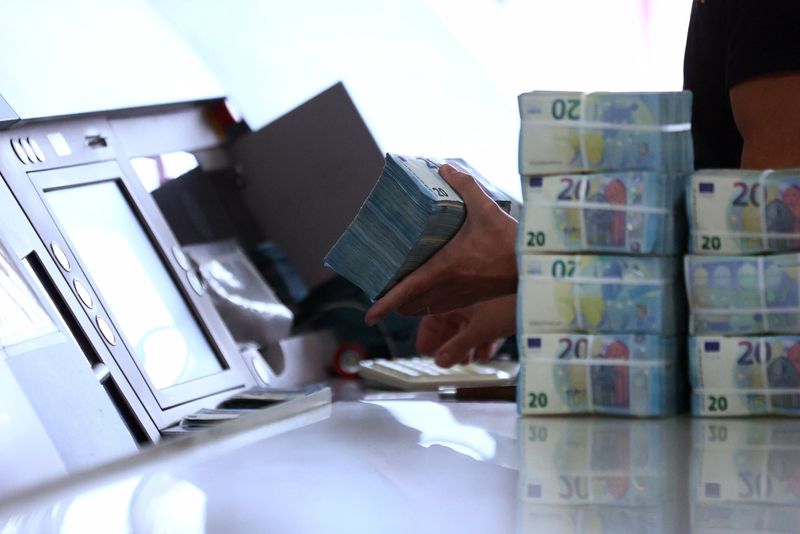By Francesco Canepa
FRANKFURT (Reuters) - Euro zone banks are holding onto trillions of euros in multi-year loans from the European Central Bank, data showed on Thursday, in a headache for a central bank that needs to mop up cash to battle runaway inflation.
The ECB flooded the banking system with free loans when inflation was too low in the last decade but this is working against it now that prices are rising too fast and interest rates have to go up.
Lenders are sitting on 2.1 trillion euros ($2.09 trillion)they have borrowed under the ECB's third Targeted Long-Term Refinancing Operations (TLTRO) after choosing to give back just 6.5 billion euros at Thursday's repayment window.
The reasons aren't hard to understand: banks can make a guaranteed profit on that cash, which they had borrowed when rates were lower, by simply parking it at the ECB and they're unlikely to find such cheap funding anywhere else on the market.
But this is the opposite of what the ECB needs in its fight against inflation.
The ECB raised its rate on bank deposit from zero to 0.75% last week in a bid to increase borrowing costs in the economy and cool off price growth.
But lenders haven't fully taken that hike on board and they are lending to each other at just 0.66%, the one-month swap on the ECB's ESTR overnight rate showed on Thursday.
While the difference may not seem much, it is a wider spread than has been the case since the 2020 pandemic-related ructions in money markets.
In the same vein, rates on German repurchase agreements, where investors borrow bonds in return for cash, have only risen around 55 bps, according to Commerzbank (ETR:CBKG) data. [GVD/EUR]
Analysts blamed this on the excess cash created by the ECB via TLTRO and its massive bond-buying programme.
"The ECB should call in the TLTRO, it's just free money for the banks at this point," Arne Petimezas, an analyst at Dutch broker AFS Insight, said.
"The ECB is trying to make liquidity conditions tighter and this is the exact opposite."
ECB policymakers broached the subject at the meeting last week but judged that current proposals aimed at making excess cash less attractive needed more work, sources told Reuters. One added a decision might still come before the ECB's next policy meeting on Oct 27.

Analysts at ING said one option would be to stop remunerating excess reserves in proportion to a bank's TLTRO balance or change the terms of the loans -- although they cautioned these options would hit Italian banks disproportionately.
($1 = 1.0024 euros)